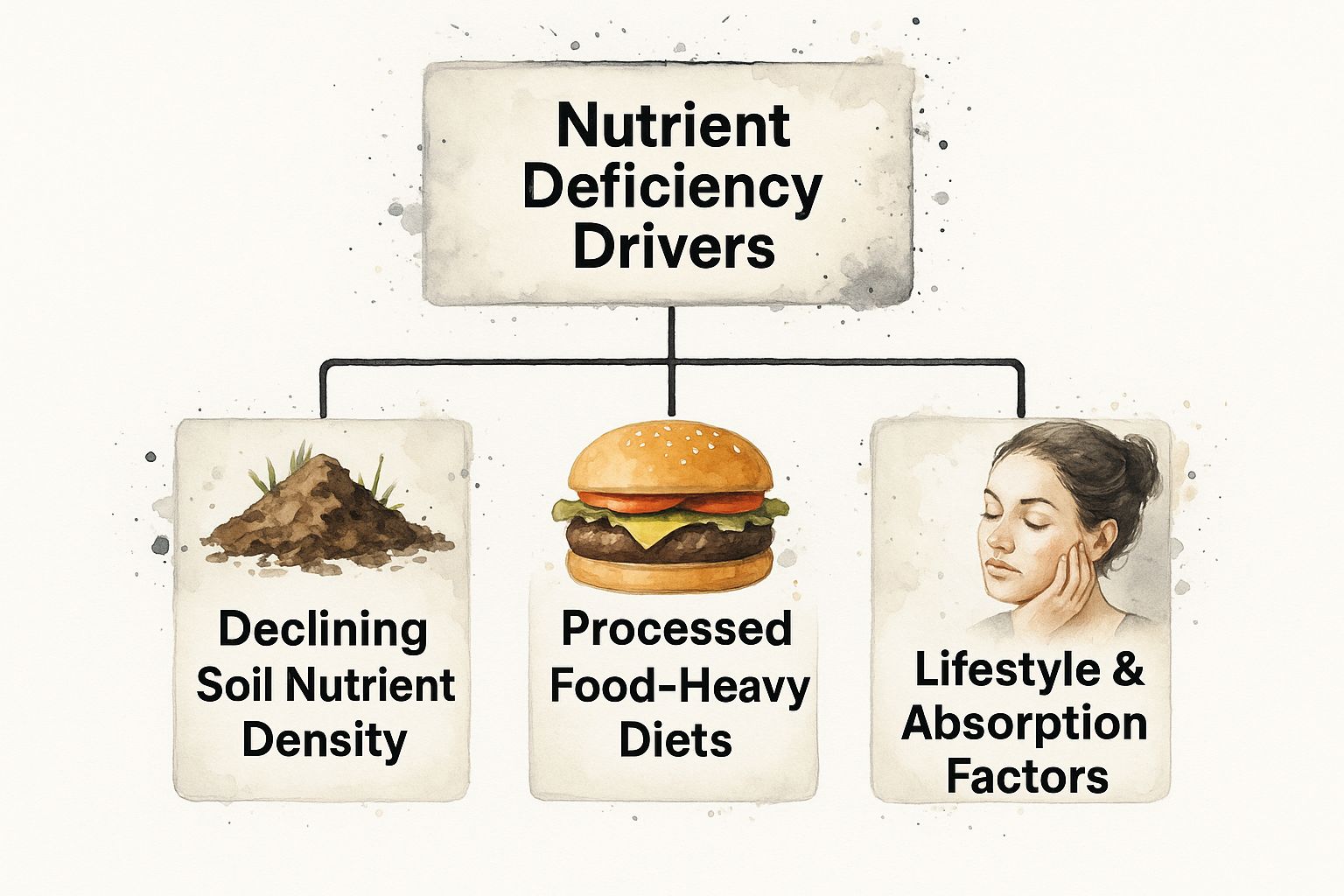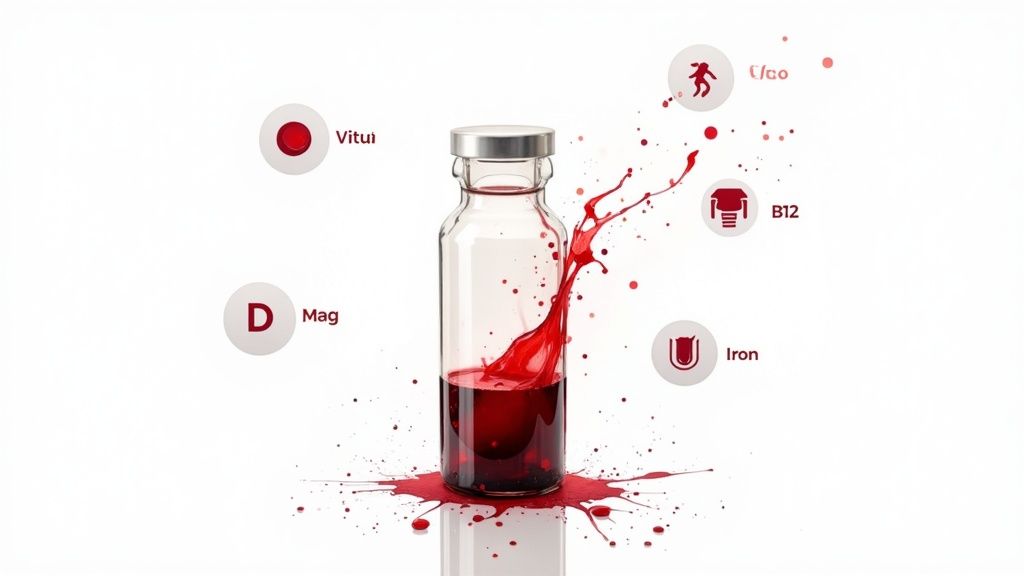A vitamin and mineral deficiency blood test is a crucial tool for anyone serious about longevity. It measures the precise levels of key micronutrients in your bloodstream, moving you beyond guesswork to pinpoint specific shortfalls that could be undermining your long-term health, cellular energy, and immune resilience. Think of it as your personal data roadmap for extending your healthspan.
Is ‘Hidden Hunger’ Sabotaging Your Longevity Goals?
Imagine your body is a high-performance engine built to last a century. You can fill it with premium fuel (a healthy diet), but it will never perform optimally or endure if essential fluids like oil or coolant are low. This is the perfect analogy for ‘hidden hunger’—a subtle, often unnoticed lack of key vitamins and minerals that can accelerate the ageing process and compromise your long-term vitality.
Even with a conscientious diet, modern life creates nutritional gaps. Chronic stress, declining soil nutrient quality, and a reliance on processed foods can systematically deplete your body's reserves, silently impacting your health at a cellular level.

Uncovering Your Personal Longevity Data
A vitamin and mineral blood test is an internal audit for your body. It bypasses generic health advice and provides hard data on your unique biological requirements. Instead of guessing which supplements might support healthy ageing, you get a clear, actionable picture of your current micronutrient status, allowing for precision adjustments.
This proactive approach is the bedrock of any effective longevity strategy. By identifying and correcting deficiencies early, you are directly supporting the systems essential for a long, healthy life:
- Cellular Energy: Nutrients like B vitamins and magnesium are fundamental for mitochondrial function, converting food into the cellular energy that powers your entire body.
- Immune Resilience: Vitamins C, D, and zinc are critical for a robust and balanced immune system, a cornerstone of healthy ageing.
- Cognitive Function: Iron, B12, and omega-3s are essential for maintaining brain health, preserving memory, and ensuring clear focus as you age.
- Structural Integrity: Calcium, vitamin D, and magnesium are the non-negotiable building blocks for maintaining bone density and muscle mass, key factors in physical independence later in life.
By measuring your internal biochemistry, you shift from a reactive mindset of treating age-related symptoms to a proactive one focused on optimising your healthspan—the number of years you live in vibrant health.
Ultimately, this test provides a personalised blueprint for longevity. It empowers you to fine-tune your nutrition with precision, making it an indispensable tool for anyone committed to building a resilient, high-vitality future. The insights you gain enable informed decisions that have a real, lasting impact on how you age.
Why Nutrient Deficiencies Are a Growing Concern in the UK
It's a modern paradox: despite unprecedented food availability, nutrient deficiencies are becoming more prevalent across the UK. The issue isn't a lack of calories, but a decline in nutritional quality. The food we eat often lacks the vital micronutrients required for optimal, long-term health, a trend with significant consequences for public health and individual longevity.
What's driving this? The problem is multifaceted. Decades of intensive agriculture have depleted our soil of essential minerals, meaning today's fruits and vegetables don't possess the same nutritional density as they did in previous generations. Furthermore, modern diets are frequently dominated by ultra-processed foods, which are calorie-dense but nutrient-poor, leaving our bodies undernourished at a cellular level.
Key Drivers of Nutritional Gaps
Even if you prioritise a healthy, whole-food diet, you may still be at risk. Lifestyle factors like chronic stress, inadequate sleep, and certain medications can impair your body's ability to absorb and utilise nutrients effectively. This creates a scenario where you could be consuming sufficient nutrients but still develop a deficiency that quietly compromises your long-term health.
This infographic illustrates the primary factors contributing to this issue.

As you can see, the combination of modern agriculture and lifestyle pressures makes it increasingly challenging to meet our nutritional needs through diet alone.
The Real-World Impact on Public Health
This is not just a theoretical concern; it's reflected in official health statistics. Between 2001 and 2021, hospital admissions in England related to vitamin deficiencies increased by a staggering 5.4-fold. This dramatic rise indicates a widespread problem that places a significant burden on the NHS.
This data highlights a crucial shift. Monitoring your nutrient status is no longer a niche interest for biohackers but a fundamental component of a resilient, long-term health strategy for every UK resident.
Understanding your personal nutrient status is the first step toward building a foundation for a longer, healthier life. For example, low Vitamin D is extremely common in the UK due to limited sun exposure, which can impact immune function, inflammation, and mood. You can learn more by reading our guide on maintaining normal vitamin D levels in the UK.
A vitamin and mineral deficiency blood test provides the critical data to see what’s happening inside your body. It eliminates guesswork, giving you clear, actionable information to correct any imbalances and truly optimise your healthspan.
What a Nutrient Blood Test Actually Reveals
Receiving your blood test results is like being handed a personalised blueprint for your healthspan. While the page of names and numbers may seem complex, understanding them is one of the most empowering actions you can take for your long-term health. A vitamin and mineral deficiency blood test doesn't just identify current problems; it provides a strategic roadmap for maintaining vitality for decades to come.
Think of your body as a high-performance biological system. To function optimally and resist the effects of ageing, it requires a precise balance of micronutrients. This test is a diagnostic check that reveals exactly which components are suboptimal, so you can make targeted adjustments to enhance your cellular health and resilience.

Fat-Soluble vs. Water-Soluble Vitamins
To interpret your report effectively, it’s helpful to understand the two main categories of vitamins. This distinction affects how your body stores and uses them, which is key to understanding what your levels signify for your long-term health.
-
Fat-Soluble Vitamins (A, D, E, K): These vitamins are stored in your body’s fatty tissues and liver. Because they can accumulate over time, maintaining optimal levels—not too high and not too low—is crucial for long-term health.
-
Water-Soluble Vitamins (B-complex, C): Your body does not store these vitamins for long; it uses what it needs and excretes the rest. This means a consistent daily intake is essential to keep your levels within the optimal range for cellular function.
This is why a single test can reveal both a chronic issue, like low Vitamin D from months of insufficient sun exposure, and a more recent dietary shortfall, like a dip in Vitamin B12.
Key Markers on Your Longevity Journey
Your test results will illuminate several critical nutrients that are central to healthy ageing. These aren't just for general wellness; they are the fundamental components of the biological machinery that powers everything from your cellular repair mechanisms to your cognitive function. For a deeper dive, get your blood test results explained in our UK guide.
Let’s examine some of the most important markers and their implications for your healthspan.
Key Markers in a Nutrient Deficiency Blood Test
This table breaks down some of the most impactful markers on your report, explaining their role in longevity and the signs that might indicate a suboptimal level.
| Nutrient Marker | Role in Longevity | Common Deficiency Symptoms | Optimal Range (UK Units) |
|---|---|---|---|
| Vitamin D | Regulates immune function, inflammation, bone density, and mood. | Fatigue, bone aches, frequent illness, low mood. | 75–150 nmol/L |
| Vitamin B12 | Essential for nerve health, DNA synthesis, and red blood cell formation. | Brain fog, fatigue, tingling in hands/feet. | > 350 pmol/L |
| Iron (Ferritin) | Crucial for oxygen transport, cellular energy production, and cognitive function. | Weakness, shortness of breath, poor concentration. | 50–150 µg/L |
| Magnesium | A co-factor in over 300 enzymatic reactions, vital for muscle function, nerve signalling, and metabolic health. | Muscle cramps, poor sleep, anxiety, fatigue. | 0.85–1.10 mmol/L |
Knowing these numbers allows you to shift from a passive approach of simply avoiding disease to proactively building a body that is resilient, energised, and optimised for a long, healthy life.
The Most Common Deficiencies Affecting UK Adults

While individual nutrient needs vary, national survey data reveals distinct patterns: certain deficiencies are widespread across the UK. These are not rare conditions but common nutritional gaps affecting millions, often silently undermining our long-term health and vitality.
Understanding these national trends helps you recognise your own potential risks and underscores why a vitamin and mineral deficiency blood test is a more effective strategy than guesswork.
Three nutrients consistently emerge as top concerns for UK adults: Vitamin D, iron, and folate. Each plays a critical role in functions essential for healthy ageing, and a deficiency in any one can significantly impact your daily performance and future well-being.
The Sunshine Vitamin Shortfall
Given the UK's limited sunshine, it's no surprise that Vitamin D deficiency is endemic. While often associated with bone health, its role in longevity is far more extensive. It is a vital modulator of the immune system, helps control inflammation (a key driver of ageing), and supports mood. Low levels can lead to chronic fatigue and increased susceptibility to infections.
The National Diet and Nutrition Survey starkly illustrates this problem. Between 2019 and 2023, deficiency was identified in 18% of adults aged 19–64 and 23% of adolescents. These figures confirm why official guidance recommends Vitamin D supplementation, particularly during autumn and winter.
Iron and Folate: The Energy and Repair Crew
Iron and folate (a B vitamin) are essential for producing healthy red blood cells, which transport oxygen to every cell in your body. When levels are low, cellular oxygenation is impaired, leading to persistent fatigue, cognitive fog, and breathlessness—symptoms that directly impact your quality of life.
Iron deficiency is especially common in women of childbearing age due to menstruation, often leading to profound exhaustion that affects work, exercise, and overall vitality. If you are experiencing persistent fatigue, it is crucial to investigate the causes of low iron levels.
The same national survey revealed an even more alarming statistic for folate: an incredible 83% of women of childbearing age had levels below the threshold recommended to prevent neural tube defects during pregnancy.
Beyond fatigue, specific deficiencies can manifest in other ways. For instance, understanding the role of specific vitamins in preventing hair loss often points back to these common nutrient shortfalls. By precisely identifying these gaps with a blood test, you gain the data needed to correct them, directly boosting your energy, cognitive function, and long-term health resilience.
Turning Your Test Results into a Longevity Action Plan
Your blood test results are more than just data points; they are a personalised instruction manual for building a longer, healthier life. Data is only powerful when it’s translated into action, and a vitamin and mineral deficiency blood test provides the precise information needed to create a targeted and effective longevity plan.
The critical first step is a mindset shift: aim for ‘optimal’ rather than ‘standard’. The standard reference range on a test result indicates where you fall relative to the general population. For longevity, the goal is to be in the optimal range—a narrower, healthier band where your body's systems are functioning at their peak.
This is a vital distinction. Being "in range" might mean you're not acutely ill, but it doesn't mean you're thriving. Aiming for optimal is the essence of proactive health—moving from merely surviving to actively building resilience for the decades ahead.
Creating Your Data-Driven Strategy
Armed with your results, the next step is to collaborate with a healthcare professional to build your plan. This process is about using your unique data to make strategic adjustments, not about following generic wellness trends.
A successful longevity plan typically involves three key steps:
-
Targeted Dietary Adjustments: Instead of a radical diet overhaul, focus on incorporating specific foods rich in the nutrients you need. For example, if your magnesium is suboptimal, adding a daily handful of pumpkin seeds or a portion of spinach is a simple, powerful intervention.
-
Strategic Supplementation: Diet alone is sometimes insufficient to correct a significant deficiency efficiently. Your results will guide you toward the right high-quality, bioavailable supplements to fill specific gaps and restore optimal levels quickly.
-
Monitor and Adjust: Your biochemistry is dynamic. Plan to re-test in 3-6 months to measure your progress, verify that your strategy is effective, and make any necessary adjustments.
This data-driven approach is increasingly essential. A recent study found that nearly 48% of the UK population fails to meet daily vitamin and mineral recommendations, with young adults being particularly affected.
Case Study: A Longevity Plan in Action
Consider Alex, a 45-year-old professional who felt chronically fatigued despite a "healthy" diet. His blood test revealed suboptimal levels of Vitamin B12 and magnesium. Instead of attributing his fatigue to age, he used this data to build a simple action plan.
"Seeing the numbers made it real. It wasn't just 'feeling tired' anymore; it was a specific problem with a clear solution."
Alex’s plan was straightforward. He consciously increased his intake of B12-rich foods like salmon and eggs and began taking a high-quality magnesium glycinate supplement before bed. Within six weeks, he reported a significant improvement in energy and sleep quality. A follow-up test confirmed his levels had moved into the optimal range, demonstrating a direct link between targeted action and improved vitality.
A comprehensive longevity plan also involves understanding how mineral deficiencies affect organ systems. Low levels of key minerals can lead to electrolyte imbalances, for instance. Learning about the impact of electrolyte imbalances on heart health shows how your test results provide the critical insights needed to protect your long-term wellness.
A Few Common Questions About Nutrient Testing
It’s natural to have questions when first exploring nutrient testing. Understanding the logistics, accuracy, and best practices helps transform a simple vitamin and mineral deficiency blood test into a powerful tool for your long-term health strategy. Let's address some common queries.
How Often Should I Get Tested?
For a healthy individual focused on optimisation, a baseline test is an excellent starting point—it creates the first draft of your personal health map. Based on those results and any subsequent changes to your diet or supplementation, re-testing every 6 to 12 months is a sensible cadence to track progress and stay on course.
If your initial test reveals a significant deficiency, your healthcare provider will likely recommend a follow-up test sooner, typically within 3 to 6 months, to ensure your intervention plan is working effectively. The ideal frequency depends on your individual health status and longevity goals.
Regular testing transforms your health journey from one of guesswork to a data-driven process. It empowers you to make precise, intelligent adjustments, ensuring your body is consistently supplied with what it needs to thrive.
Can I Fix Deficiencies with Just My Diet?
A whole-food, nutrient-dense diet is the non-negotiable foundation of good health and should always be the primary strategy. For minor dips in nutrient levels, consistent and targeted dietary changes can often be sufficient to restore you to an optimal range.
However, for more significant deficiencies, targeted supplementation is often the most efficient and reliable method to restore optimal levels. This is particularly relevant for certain nutrients that are challenging to obtain in sufficient quantities from diet alone, especially in the UK:
- Vitamin D: Achieving optimal levels from sunshine is difficult for much of the year in the UK.
- Vitamin B12: This is a key consideration for those following vegan or predominantly plant-based diets.
- Iron: Absorption issues or higher physiological needs can make it difficult to correct a deficiency quickly through diet alone.
Your blood test results provide the clarity needed to decide whether a food-first approach is sufficient or if strategic supplementation is required to support your long-term health goals.
Are At-Home Finger-Prick Tests Accurate?
Modern at-home finger-prick tests have advanced significantly and are now a reliable and convenient method for monitoring many key nutrient levels. When performed correctly, their accuracy is high, making them an excellent tool for tracking your progress between more comprehensive tests.
However, a venous blood draw performed by a professional remains the gold standard for a definitive clinical diagnosis. A venous sample is larger, allowing for a broader range of markers to be tested with less risk of contamination. For your initial comprehensive baseline test, a venous draw is often the best choice. Subsequently, finger-prick tests are a superb and convenient option for regular monitoring and adjustments.
Ready to stop guessing and get a clear picture of what’s really going on inside? Lola brings professional, at-home blood testing right to your door, giving you the actionable data you need to build your own longevity plan. Discover your optimal health today.

